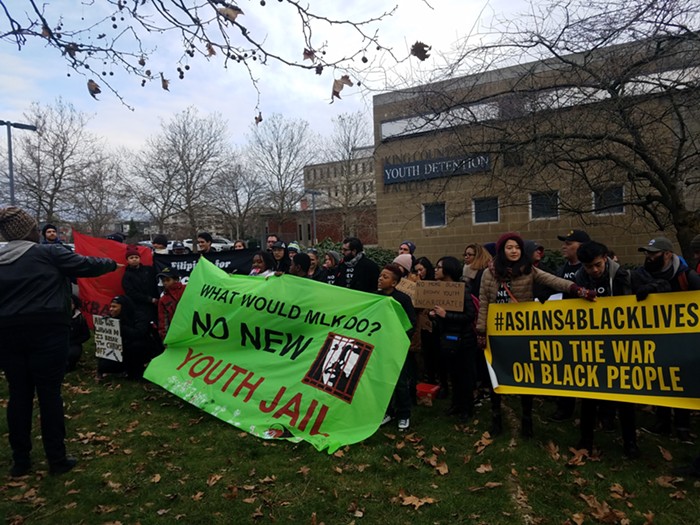
Anti-incarceration activists gathered outside of the King County Youth Detention Center on Wednesday afternoon as part of an appeal to stop the City of Seattle's Department of Construction and Inspections (SDCI) from issuing a master use permit allowing the construction of a new youth prison. The new facility, which was approved by voters in 2012, will be called the Children and Family Justice Center.
Organizers, including representatives from Ending the Prison Industrial Complex (EPIC) and Africatown, have spent the last several months calling on local politicians to halt the construction of the center, which would cost about $210 million and include more social services and 112 beds, about half of what the jail currently has. Despite the activists' protests, officials with the City of Seattle's Department of Construction and Inspection (SDCI) still approved a master use permit to allow the construction to begin. Activists submitted a legal appeal to contest the permits and ask for an additional environmental review study to be done on Jan. 4.
Organizers anticipate receiving a response regarding the appeal in the next two months, Katherine Brennan, an attorney with Smith & Lowney PLLC representing EPIC, told The Stranger after the press conference.
Building a new youth detention center goes against King County's projected image of being one of the most progressive counties in the country and the city's mission of not jailing kids. The appeal is the next step forward in blocking the construction of the Children and Family Justice Center, which, said Senait Brown, co-chair of EPIC.
"[The county] has not invested in a plan to stop youth incarceration," she said. "Young people will transition out of youth imprisonment. We know it won't happen overnight, but [city officials] have to have the intention to support the real alternatives [such as social services]."
Plans for the proposed Children and Family Justice Center would include family services, crisis and violence intervention, among other diversion programs.
The money spent on the jail should be invested into existing programs in Seattle communities, which would better benefit youth, said Brown.
"This is a dehumanizing place to be," she said. "You can't get rehabilitated by being in a jail."
MLK did not give his life for a new youth jail. This is not his legacy, says Garrett. #nnyj pic.twitter.com/SBmD4GvHjz
— Ana Sofia Knauf (@asknauf) January 11, 2017
Wyking Garrett on #nnyj: "We pride ourselves on being a blue city. ... We need to be against Trump-style development in our community."
— Ana Sofia Knauf (@asknauf) January 11, 2017
Wyking Garrett, a community advocate for Africatown, told the crowd that constructing a new youth jail is a "negative development" for the Central District, a historically Black neighborhood created by discriminatory redlining practices.
"We want Africatown and the Central District to be prison free just like Broadway is prison-free, just like Madison Park is prison-free," said Garrett.
"This place is a toxic site," said Jill Mangaliman, executive director of climate justice nonprofit Got Green.
Not only are people of color are disproportionately incarcerated, they also feel the effects of pollution more acutely, Mangaliman told a crowd of reporters and community members.
The $210 million that would be spent on the jail could be better and more effectively used at underfunded schools and social service programs in marginalized communities, said Jerrell Davis, an organizer and educator with Washington Building Leaders of Change and the Rainier Beach Action Coalition.
Shortly after the press conference finished, Benton Strong, communications director for Mayor Ed Murray, issued the following statement:
The Mayor has no legal authority to affect SDCI’s technical permitting decisions. We have been reminded of the dangers of executive interference in permitting decisions and Mayor Murray remains committed to respecting the limits of executive power.
Last week, an appeal of this decision was filed with the Hearing Examiner. If the County withdraws its permit application, the City will not defend SDCI’s land use decision in front of the Hearing Examiner. To date, the County has not withdrawn its application.
Addressing systemic racial disparities, including those in our criminal justice system, continues to be a priority for Mayor Murray’s administration. We remain specifically focused on better connecting our youth with jobs and career pathways and supporting all local efforts to expand alternatives to incarceration such as Family Intervention and Restorative Services and Youth LINC, to offer coordinated service to at-risk youth. Additionally, Mayor Murray plans to transmit legislation for accountability reform in our police department in the coming weeks, as we work toward our goal of repairing the relationship between police and our community.
"We know from the sausage-making about the civic square project that permit decisions of this type are political," Knoll Lowney, an attorney representing EPIC, told us the day after the press conference. "The Mayor has the power. He could have told his staff not to, for example, not to issue the statement [right before] Christmas Eve. That's a political decision issued by Murray's admin to prevent public involvement in the permit decision."
He continued: "Murray needs to take a position in opposition to this jail. Right now, this is a facility that in our mind, is owned by Dow Constantine and Mayor Murray. If Murray wants to be on the right side of this issue, he needs to take a position against and tell him to slow down on this misguided and racist project. This isn't a situation where smart minds can disagree."
Murray's office disputes that claim in the statement, above. Representatives from King County Executive Dow Constantine's office did not return calls for comment by the time of publication.
2/2 bc of stigma of having felonies. She said she'd rather die. "Why are we afraid of young ppl rather than system that kills?" Oliver asks
— Ana Sofia Knauf (@asknauf) January 11, 2017


















